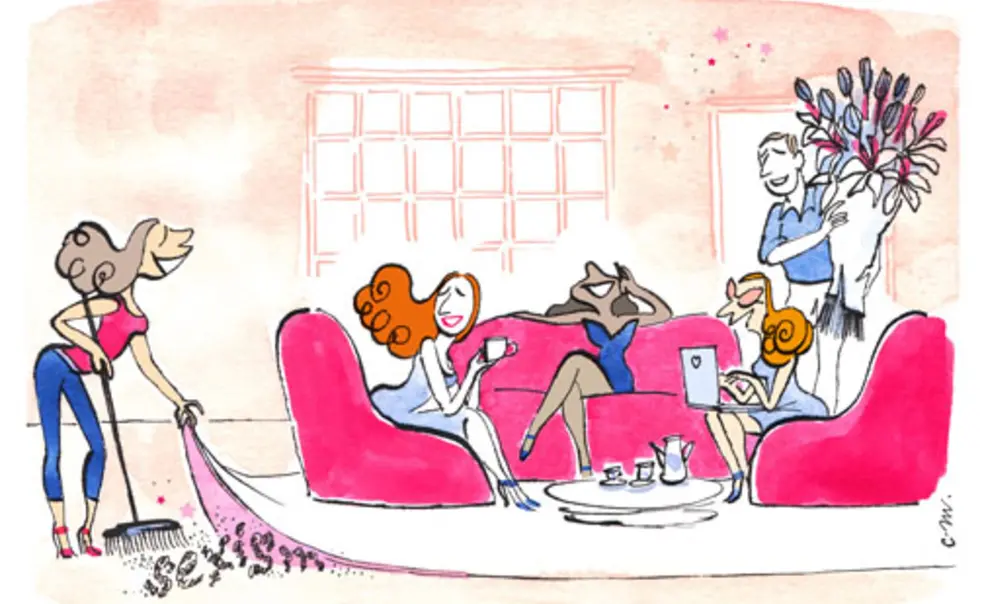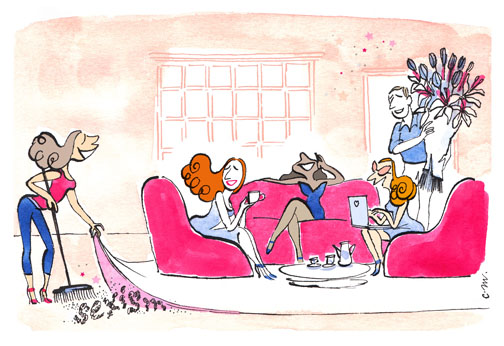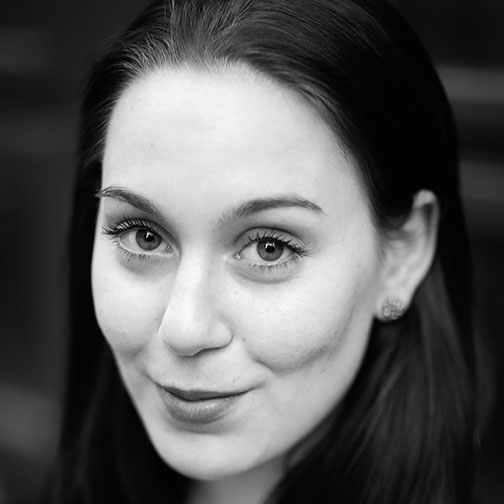Essay: Postfeminist Fantasies: New Characters, Old Plot
“This sounds familiar,” I thought to myself, as I read that letter to the editor in The Daily Princetonian. You know, that letter, the one in March that stirred up heated and endless conversations about gender, marriage, sex, power, money, prestige, and what it means to get a Princeton education.
The message of that letter — get a great education, sure, but make sure you get someone to marry you, too, ladies — sounded so familiar to me because I spend my days watching the silver-screen version of what I read in the Prince. I spend my days watching romantic comedies.
I’m getting my doctorate in media studies, and my dissertation, almost complete now, is about depictions of gender, sex, and power in the genre everyone loves to hate — or hates to love. I have spent the last few years watching almost every Hollywood romantic comedy that’s come out in the last decade, and thinking about what those movies say about what it means to be a woman, and what it means to be a man, in America in this cultural moment.
It might sound foolish to turn to this ostensibly light and fluffy genre to take stock of something so serious, but the romantic comedy is centuries old. Before there were movies, there were novels and plays, all of them repeating similar plots and subplots, over and over again. Those narratives are about love and marriage and the proper roles of men and women (I’m looking at you, Katherine and Petruchio), and by observing how they change or persist over time, we can learn a lot about how our ideas about gender have changed and persisted, too.
For years, romantic comedies have been set in what appears to be an alternate reality: a world where downtrodden executive assistants can afford gorgeous one-bedroom apartments in New York City, or where your boss doesn’t mind that you spend all day talking with your colleagues about relationships and never seem to do your job. In her book Is Everyone Hanging Out Without Me? writer and actor Mindy Kaling, an admitted rom-com lover who has been in quite a few of them herself, writes: “I simply regard romantic comedies as a subgenre of sci-fi, in which the world created therein has different rules than my regular human world. ... There is no difference between Ripley from Alien and any Katherine Heigl character. They’re all participating in the same level of made-up awesomeness.” Except that, from where I sit, it’s not so much awesome as it is cause for concern.
Romantic comedies of the last decade take place in a fantasy world that is, unlike the world in which we actually live, postfeminist. By that I mean it’s a world where gender inequality no longer exists, and where things that once might have been considered sexist no longer are, because sexism is over.
In this fantasy world, all women have the same opportunities that men do — in education, in employment, even in bed. There is no leadership gap on college campuses. There is no wage gap in the workforce. There is no sexual assault, and no shaming of women who seek and enjoy sex. There sometimes is a question of how women can “have it all” — how they can balance work and family; after all, last year Sarah Jessica Parker starred in a rom-com called I Don’t Know How She Does It. But the solutions to that problem are always personal, individual ones, not structural ones like government-mandated paid parental leave or ending pregnancy discrimination. In this celluloid world, everyone is equal.
The problem with this postsexist, postfeminist world is that it looks an awful lot like the sexist, prefeminist world. Sure, the women now have great educations, and yes, a lot of them have high-powered jobs, but many of them give them up, or scale them back, to make room for love. In Just Like Heaven, a 2005 rom-com, Reese Witherspoon plays a talented and committed young doctor who, after a car accident puts her in a coma, haunts the man subletting her apartment as a sort of half-ghost. When she laments that she didn’t spend her time on Earth wisely, he reminds her that, as a doctor, she saved lives. “I saved my own life, for later,” she says. Hear that, ladies? Being a doctor is a waste of a life, if you don’t also have a husband. In Kate & Leopold, the heroine (Meg Ryan) travels through time, abandoning 2001, where she has a high-powered corporate job, to be with the Duke of Albany (Hugh Jackman) in 1865. She leaves behind her stressful job, but she also leaves behind the right to own property, the right to vote, and contraception. But it’s worth it to be with the man of her dreams, right?
It is a given, in this postfeminist world, that women have all the rights and opportunities that men have (time travelers notwithstanding). Gender equality is taken for granted. So when the heroines choose, in rom-com after rom-com, to give up those opportunities, it isn’t “sexist,” these movies tell us. These women are just doing what they really want to do — and what they really want to do is exactly what they did before they had any other options.
In this landscape, it is the postfeminist heroine who usually wins the day. The postfeminist heroine enjoys the benefits of feminism, but she’s not a feminist. In fact, she rolls her eyes at feminism. She’s liberated, but without being annoying about it. In Forgetting Sarah Marshall, Rachel (Mila Kunis) goads her love interest into jumping off a cliff into the ocean, as she has done already. “Come on, Peter,” she yells from the water as he hesitates, “I can see your vagina from here.” The postfeminist heroine isn’t like other women, the ones who complain about sexism. She’s cool. Kunis, like other actresses who play postfeminist heroines — Jennifer Lawrence, Emma Stone — is still gorgeous by conventional standards, of course, but the postfeminist heroine doesn’t try to be gorgeous. She’s not girly like that. And of course, the postfeminist heroine gets her “happy ending” — marriage and motherhood — which is exactly the same happy ending that prefeminist heroines got.
That Prince letter performed precisely the same function as these slick, romantic fictions: promoting old-school values, but painting them with a shiny, pseudo-feminist, “you go, girl” gloss. That’s why it sounded so familiar to me, after three years of watching these movies. It was telling the same old story to a new generation of young women.
Chloe Angyal ’09 is an Australian writer and commentator who lives in New York City. Read more of her work at chloesangyal.com.














1 Response
JoAnn L. Fuir s’78
10 Years AgoPostfeminist Mom’s Rewards
I am writing in response to Chloe Angyal ’09’s essay, “Postfeminist Fantasies: New Characters, Old Plot” (Oct. 23). She wrote, “the postfeminist heroine gets her ‘happy ending’ — marriage and motherhood — which is exactly the same happy ending that prefeminist heroines got.” This seems to imply that marriage and motherhood are not a rewarding profession.
As a middle-aged, college-educated woman who has dedicated 21 years of her life to child-rearing and domestic responsibilities (by choice!), I honestly can say that I have no regrets. My husband, Scott Fuir ’78, and I have been happily married for more than 25 years and have three wonderful children. I firmly believe that I have made a positive contribution to our world, even though I often wore jeans and a T-shirt instead of a “gender-neutral” power suit.
I was the “postfeminist” mother who faithfully volunteered to assist with classroom activities and field trips. I was the former educator who spent countless hours tutoring children in public schools, free of charge. I also organized several “mom and tot” groups for college-educated women who chose full-time motherhood as a vocation.
Cormac Burke wrote that radical feminists have convinced women that motherhood is no more than “an unjust burden of nature. For them, it is not only a woman’s right to put professional achievement first in her priorities of fulfillment, it is even her duty.” Tragically, when women reject the mystery of motherhood, they deny their unique feminine identity. Obviously, men are not designed to bring new life into the world — so it is up to brave women to bear and nurture children for the good of our society.
Remember, ladies, “the hand that rocks the cradle rules the world!”